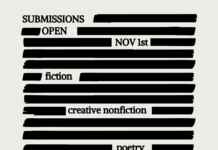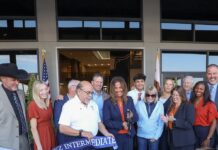
By Tomas Kassahun | Reporter
@TomasKassahun
Four panelists gathered at Fresno State on Thursday, Feb. 9 to lead a discussion on fake news.
The panelists included Faith Sidlow, professor of Media, Communications and Journalism; Jes Therkelsen, professor of Media, Communications and Journalism; Jim Boren, executive editor and senior vice president of The Fresno Bee; as well as Joe Moore, director of program content, Valley Public Radio FM 89.3.
In front of a packed crowd in the Alice Peters Auditorium, the panelists discussed the effects of fake news and offered solutions on how it can be stopped.
“Real reporters gather information on the scene and don’t wait for something to pop up on the internet,” Boren said. “Our reporters go to the scene of news events, talk to people in person. These are not second-hand news sources.”
Boren added that The Fresno Bee’s reporting is unlike fake news, which is often subjective.
“We believe quality journalism matters to our readers,” Boren said. “Our goal is to offer honest, unbiased, verified reporting. We want to empower our readers to help them make their own decisions about their daily lives.”
Boren brought up the concept known as Journalism of Affirmation, news that is solely prepared to confirm a person’s preexisting beliefs.
This issue with Journalism of Affirmation has led people on the left and right to hate each other, Boren said.
“I come from an era where republicans and democrats disagreed with one another during the day, but they have dinner and drinks together at night,” Boren said. “ Now, they’re considered traitors if they socialize with the other side.”
As he discussed how honest reporting can also hold the government accountable, Boren cited a few examples from the Fresno Bee.
“We want to hold government accountable, which is what we did with our four-month investigation of slum lords, controversies with Fresno Unified School District, water crisis in northeast Fresno,” Boren said.
Moore echoed Boren’s take on Journalism of Affirmation.
“We seek out outlets that reinforce our beliefs,” Moore said. “It’s great that we have multiple news sources, but it’s our job as citizens to have an understanding of where these different sources come from. Then we have to objectively weight them.”
Sidlow presented research that shows a dramatic increase of “fake news” reports since the 2016 election.
According to the research which was conducted by BuzzFeed, 20 top-performing false election stories from hoax sites generated 8,711,000 shares, reactions, and comments on Facebook in the final three months of the US presidential campaign.
The research shows that “the top-performing fake election news stories on Facebook generated more engagement than the top stories from major news outlets such as the New York Times, Washington Post, Huffington Post, NBC News.”
“The television and internet has especially been hit hard by fake news,” Sidlow said. “We have seen so much that we don’t even know what to believe any more.”
Therkelsen said he was encouraged by the number of people who showed up to the forum.
“This shows that we want to have a discussion,” Therkelsen said. “ We’re lucky to have this discussion here. This is what progresses our society.”









